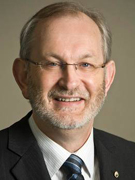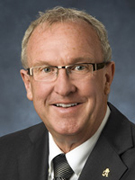Police interests welcomed
but public input ignored
B.C.’s auditor general and seven MLAs set out to whitewash
the Office of the Police Complaint Commissioner. But they
inadvertently confirmed the OPCC lacks
transparency and accountability
February 21, 2013
Eight smiley faces who flatly refused to talk with members of the public and ignored their written submissions
in order to whitewash B.C.’s corrupt OPCC: Auditor General John Doyle and MLAs Murray Coell, Kathy Corrigan,
Eric Foster, Gordon Hogg, Leonard Krog, John Slater and Joe Trasolini.
B.C. Auditor General John Doyle and a legislative committee have finished a peculiar exercise that reveals nothing new about its supposed subject, the Office of the Police Complaint Commissioner. But it still speaks volumes about our system of police oversight — and also about how politicians and government appointees give concerned citizens the finger.
The AG and seven MLAs (from two parties plus one person who now sits as an independent) have supposedly audited B.C.’s Office of the Police Complaint Commissioner. But as far as can be determined, they did so with zero public input. Amazingly the AG won’t, and the committee can’t, explain how the audit was conducted.
In December, as his part of a combined AG/committee inquiry into the OPCC, Auditor General Doyle released a brief summary of an otherwise secret report praising the agency. The summary says almost nothing about his actual findings or how they were obtained.
I wrote to Doyle with some obvious questions but received no reply. When I phoned, one of his flunkeys gave me a false excuse for the lack of response. Then, after another letter and a further delay, assistant auditor general Michael Macdonell referred all questions to the MLAs’ committee.
Committee chairperson Murray Coell and deputy chairperson Kathy Corrigan (BC Liberal and NDP respectively) at first claimed that all my questions were answered in Doyle’s report which, they further claimed, had been made public.
Wrong and wrong again. Doyle’s report hasn’t been made public. Doyle released only a brief, inadequate summary. It doesn’t answer obvious questions.
This rigmarole shows Coell and Corrigan to be slippery, evasive and dishonest. They ignored most of the questions I sent them, provided partial answers to others and in some cases gave completely false answers. But after I sent a few more e-mails they finally conceded that Doyle’s full report has not been made public and they don’t know how he conducted his audit. That runaround leaves a number of questions unanswered.
Which OPCC cases were audited? Who chose those cases? What information, from what sources, was considered? On what criteria were the cases evaluated? Did the auditor general solicit public input? That appears unlikely because there seems to have been no advance publicity.
We are told the cases were randomly chosen. But who “randomly” chose them and how? Was it the AG, the police complaint commissioner, a computer, a blindfolded file clerk or what?
Doyle’s summary did express minor concern about the time taken to handle police complaints and the need to better train police officers who handle them. But overall — and this is what Doyle and the OPCC emphasized in their December media announcements — he found the audited complaints “were in all significant respects completed in compliance with Part 11 of the Police Act.”
Part 11 concerns “misconduct, complaints, investigations, discipline and proceedings.” But buried in Doyle’s summary is this odd statement: “Excluded from the scope of the audit was providing an opinion about the validity of investigation decisions.” (Emphasis added.)
Then what the hell was he auditing?
And why didn’t he emphasize that key statement? Surely the “validity of investigation decisions” approved by the OPCC is the most important aspect of the agency’s work.
Typically, B.C.’s media missed that entirely. When the OPCC sent out its self-congratulatory news release on December 3, 2012, B.C. journalists played it up uncritically, praising Stan T. Lowe and his corrupt crew to the skies.
As the media reports came online that afternoon and evening, I sent out this news release asking obvious questions. Naturally it was ignored. Better to suck up to bigshots than consider some critical, although obvious, questions.
Meanwhile the seven-MLA committee continued its own part of the “audit,” a series of hearings that only included cop interests. The MLAs talked to B.C. director of police services and former Saanich cop Clayton Pecknold, cop lobbyists Tom Stamatakis and Sheila Sullivan of the B.C. Police Association and B.C.’s cop-friendly police complaint commissioner Stan T. Lowe. In addition, committee member Gordon Hogg held his own conference call with unnamed cops. Committee member Eric Foster is an auxiliary RCMP cop himself. Members of the public were excluded, even though some of us offered to appear.
So were our written submissions. I sent the committee four OPCC cases, all involving different people, that I requested be reviewed. At least two other people submitted additional cases, one of them connecting the OPCC with one of the most disturbing Taser assaults I’ve heard of. It was only after my repeated inquiries that Coell and Corrigan informed me that the submitted cases were ignored because they weren’t “random.”
Wow. The committee’s Website (http://www.leg.bc.ca/cmt/39thparl/session-4/rpa/5-39-4-41-9.htm) included a Call for Submissions. But it didn’t warn people that any submissions would automatically be rejected because they weren’t “random.”
As for the committee’s meetings with police interests, the Hansard shows lots of vague, meandering discussions and puffball questions.
So what was the point of this exercise? I think it was to pretend the OPCC is accountable. In fact police complaint commissioner Lowe and his crew answer to no one – absolutely no one at all. I believe the submitted cases raise strong concerns about how the OPCC handles complaints that don’t get media coverage. But there’s nothing anyone can do about it because the agency is unaccountable.
The OPCC lacks transparency too. Very little info is released about its work. In February 2012 the agency deleted its online archive of news releases. The OPCC didn’t release its 2011 annual report (a Police Act requirement) until mid-November 2012. Out of 1,151 cases it summarized just 12, which are written in cop jargon that reflects the OPCC’s police culture.
Furthermore the OPCC is being used to thwart the accountability of B.C.’s new Independent Investigations Office. In a sneaky trick supported by both the BC Liberals and NDP, the legislature evaded a key recommendation from Thomas Braidwood. Instead of putting the IIO under the provincial Ombudsperson’s authority, MLAs placed it under the OPCC’s authority.
Yet the IIO was supposed to be modelled after Ontario’s Special Investigations Unit, widely considered Canada’s best agency for police oversight. It took a lengthy investigation by Ontario Ombudsman Andre Marin to put the SIU back on track after it had become infused with cop culture. Now B.C.’s new agency comes under the authority of the OPCC, which reflects both old-school cop culture and a lack of accountability.
Again, there’s nothing anyone can do about that, or about the six OPCC cases that the auditor general and a legislative committee ignored. That’s because the OPCC answers to no one.
The auditor general and seven MLAs have inadvertently confirmed that.
Read more about this sham inquiry into the OPCC
Go to News and Comment page
See stories about Stan T. Lowe and the Office of the Police Complaint Commissioner







